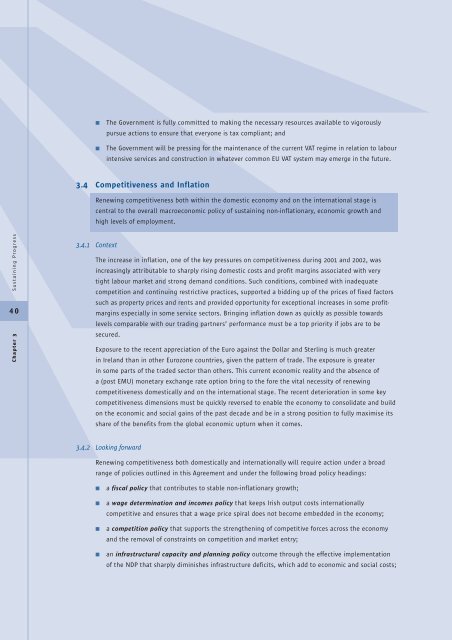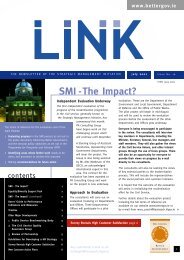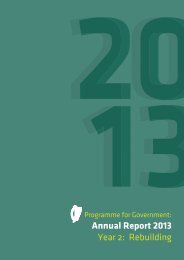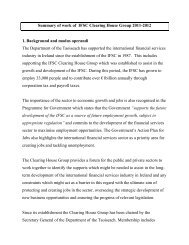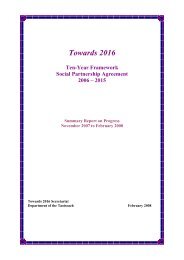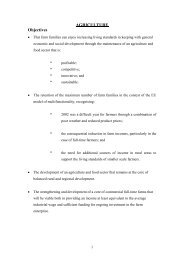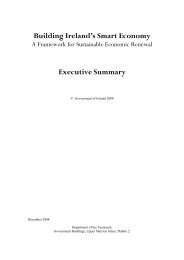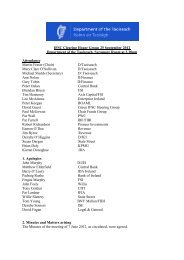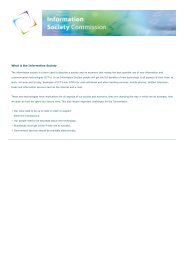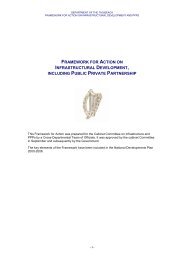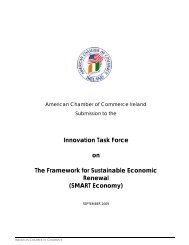Sustaining Progress - Department of Taoiseach
Sustaining Progress - Department of Taoiseach
Sustaining Progress - Department of Taoiseach
You also want an ePaper? Increase the reach of your titles
YUMPU automatically turns print PDFs into web optimized ePapers that Google loves.
Chapter 3 <strong>Sustaining</strong> <strong>Progress</strong><br />
40<br />
■ The Government is fully committed to making the necessary resources available to vigorously<br />
pursue actions to ensure that everyone is tax compliant; and<br />
■ The Government will be pressing for the maintenance <strong>of</strong> the current VAT regime in relation to labour<br />
intensive services and construction in whatever common EU VAT system may emerge in the future.<br />
3.4 Competitiveness and Inflation<br />
Renewing competitiveness both within the domestic economy and on the international stage is<br />
central to the overall macroeconomic policy <strong>of</strong> sustaining non-inflationary, economic growth and<br />
high levels <strong>of</strong> employment.<br />
3.4.1 Context<br />
The increase in inflation, one <strong>of</strong> the key pressures on competitiveness during 2001 and 2002, was<br />
increasingly attributable to sharply rising domestic costs and pr<strong>of</strong>it margins associated with very<br />
tight labour market and strong demand conditions. Such conditions, combined with inadequate<br />
competition and continuing restrictive practices, supported a bidding up <strong>of</strong> the prices <strong>of</strong> fixed factors<br />
such as property prices and rents and provided opportunity for exceptional increases in some pr<strong>of</strong>itmargins<br />
especially in some service sectors. Bringing inflation down as quickly as possible towards<br />
levels comparable with our trading partners’ performance must be a top priority if jobs are to be<br />
secured.<br />
Exposure to the recent appreciation <strong>of</strong> the Euro against the Dollar and Sterling is much greater<br />
in Ireland than in other Eurozone countries, given the pattern <strong>of</strong> trade. The exposure is greater<br />
in some parts <strong>of</strong> the traded sector than others. This current economic reality and the absence <strong>of</strong><br />
a (post EMU) monetary exchange rate option bring to the fore the vital necessity <strong>of</strong> renewing<br />
competitiveness domestically and on the international stage. The recent deterioration in some key<br />
competitiveness dimensions must be quickly reversed to enable the economy to consolidate and build<br />
on the economic and social gains <strong>of</strong> the past decade and be in a strong position to fully maximise its<br />
share <strong>of</strong> the benefits from the global economic upturn when it comes.<br />
3.4.2 Looking forward<br />
Renewing competitiveness both domestically and internationally will require action under a broad<br />
range <strong>of</strong> policies outlined in this Agreement and under the following broad policy headings:<br />
■ a fiscal policy that contributes to stable non-inflationary growth;<br />
■ a wage determination and incomes policy that keeps Irish output costs internationally<br />
competitive and ensures that a wage price spiral does not become embedded in the economy;<br />
■ a competition policy that supports the strengthening <strong>of</strong> competitive forces across the economy<br />
and the removal <strong>of</strong> constraints on competition and market entry;<br />
■ an infrastructural capacity and planning policy outcome through the effective implementation<br />
<strong>of</strong> the NDP that sharply diminishes infrastructure deficits, which add to economic and social costs;


